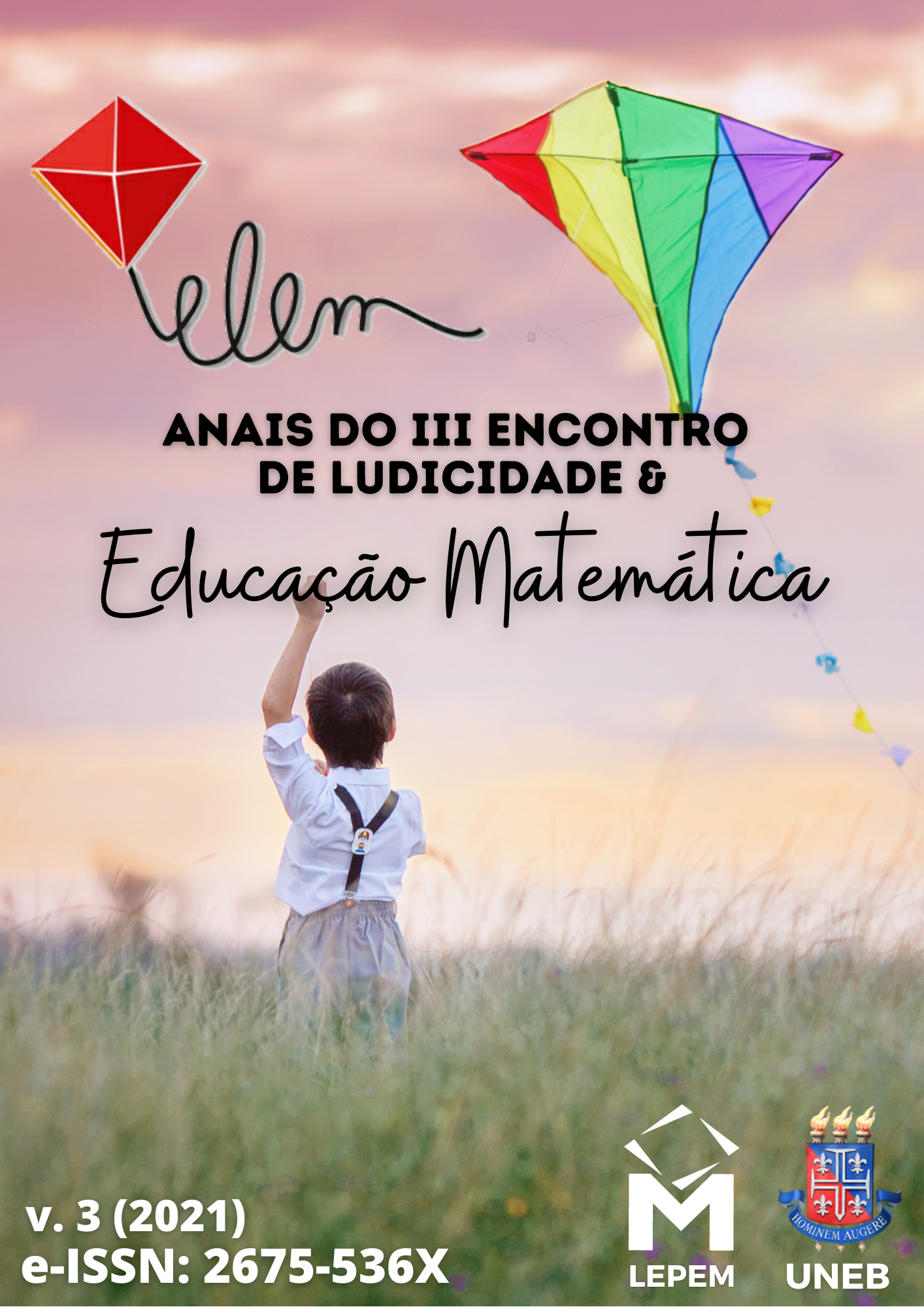As potencialidades e os desafios lúdico-pedagógicas do Laboratório de Ensino de Matemática - LEMAT no cenário do ensino remoto emergencial
Keywords:
Teaching laboratory. Math. Emergency remote teaching. Ludic.Abstract
This work aims to report the experience of members of the mathematics teaching laboratory - LEMAT, at the University of Brasília -UnB, in the realization of playful-pedagogical activities, in the context of Emergency Remote Teaching-ERE, for teachers from elementary school and undergraduates
in mathematics, from August 2020 to June 2021. The activities were developed through virtual platforms (Zoom, Meet, Teams) and made available on the GIEM channel (Research Group in Teaching of Mathematics / UnB) on youtube. To carry out the activities, theoretical studies were carried out on playfulness, the use of technologies in the teaching of mathematics, teacher training and distance and remote teaching. Subsequently, in view of the schools' requests, the activities were planned and executed with the purpose of meeting the demands, which were mostly from teachers who worked in high school. At the end of each activity, participants had the opportunity to do one through a google forms questionnaire, which allowed the organizers to have feedback on the practices. The results showed that the participants enjoyed the activities, sought to continue the educational process, making use of technological resources, resorting to the appropriation of knowledge inherent to distance learning, as well as seeking courses, lives, and other content available in the digital environment.
Downloads
References
BERTONI, N. E, e GASPAR, M. T. J. Laboratório de ensino de matemática da universidade de Brasília. 2006, pag. 137.
CAVALCANTE M. A.; PIFFER, A.; NAKAMURA, P. O Uso da Internet na Compreensão de Temas de Física Moderna para o Ensino Médio. Revista Brasileira de Ensino de Física, v. 23, n. 1, p.108-112, 2001.
GOIS, A. Incertezas, possibilidades e o que haverá de sólido na educação depois da pandemia. In: CASTRO, J. R. (Org.). O Mundo Pós-Pandemia: reflexões sobre uma nova vida. Rio de Janeiro: Nova Fronteira, 2020, p.107-112.
LORENZATO, S. O. O laboratório de ensino matemático na formação de professores. 3º ed. Campinas, SP. Autores associados. 2012.
MORAN, J. Metodologias ativas para aprendizagem mais profunda. In: BACICH, L.; MORAN, J. (org.). Metodologias ativas para uma educação inovadora. Porto
Alegre: Penso, 2018, p. 1-16.
NOGUEIRA, J.S., RINALDI, C., FERREIRA, J.M.; PAULO, S.R. Utilização do Computador como Instrumento de Ensino: uma Perspectiva de Aprendizagem Significativa. Revista Brasileira de Ensino de Física, v. 22, n. 4, p. 517-522, 2000.
SÁ, Antônio Villar Marques; NOGUEIRA, C. A.; JESUS, B. G. Anais do II Encontro de Aprendiza¬gem Lúdica. 2017. Disponível em: http://repositorio.unb.br/handle/10482/23065. Acesso em: 29 abr. 2017.
SÁ, A.V. M; SILVA, A. J. N.; BRAGA, M. D.; SILVA, O. Ludicidade e suas interfaces. Brasília: Liber Livro, 2013.
SANTOS, S. M. P (Org.). O lúdico na formação do educador. 9. ed. Petrópolis: Vozes, 2011.
SILVA, W. P.; SILVA, C.M.D.P.S; SILVA, C.D.P.S.; SOARES, I.B.; SILVA, D.P.S.; Apresentação do Software Educacional "Vest21 Mecânica". São Paulo: Revista Brasileira de Ensino de Física. V. 24, n. 2, p. 221-231, 2002.
Downloads
Published
How to Cite
Issue
Section
License
Uma nova publicação de artigo anteriormente publicado nos Anais do Encontro de Ludicidade e Educação Matemática, fica sujeita à expressa menção da precedência de sua publicação neste periódico, seguindo as normas de referência. Autores que publicam nos Anais do ELEM concordam com os seguintes termos:
-
O Conselho Editorial se reserva ao direito de efetuar, nos originais, alterações de ordem normativa, sintática, ortográfica e bibliográfica com vistas a manter o padrão culto da língua, respeitando, porém, o estilo dos autores. As provas finais poderão ou não ser enviadas aos autores.
-
Autores mantém os direitos autorais e concedem à revista o direito de primeira publicação, com o trabalho simultaneamente licenciado sob a Licença Creative Commons Attribution (CC BY-NC-SA).
-
Autores têm autorização para assumir contratos adicionais separadamente, para distribuição não-exclusiva da versão do trabalho publicada nos Anais do ELEM; exemplo: publicar em repositório institucional ou como capítulo de livro, com reconhecimento de autoria e publicação inicial nos Anais do ELEM.
-
Autores têm permissão e são estimulados a publicar e distribuir seu trabalho online — em repositórios institucionais, página pessoal, rede social ou demais sites de divulgação científica.





